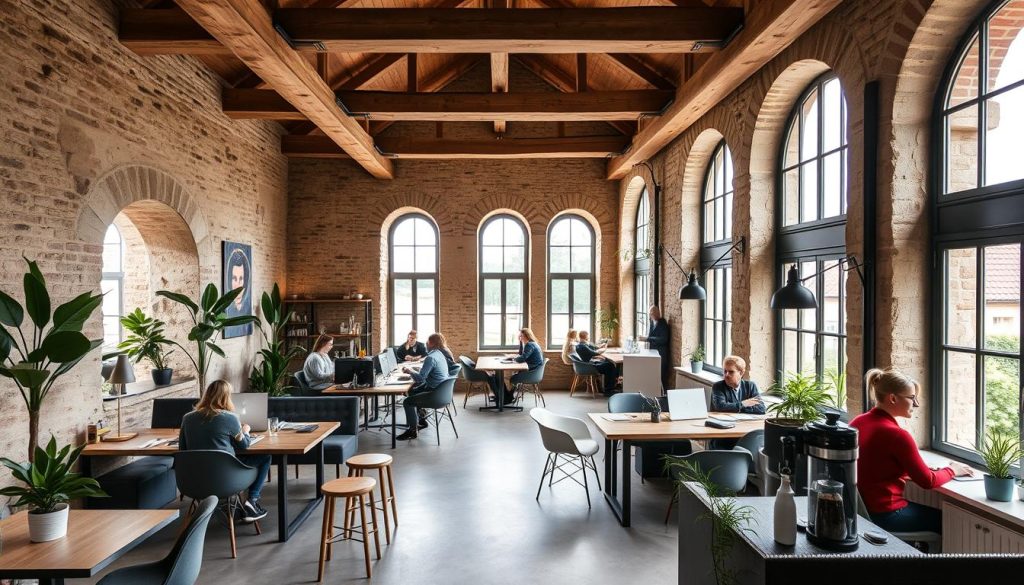France continues to be one of Europe’s most attractive destinations for foreign entrepreneurs, offering a stable economy, excellent infrastructure, and access to the EU market. Despite its reputation for bureaucracy, recent reforms have made starting a business in France more accessible than ever for foreigners. This guide explores the most promising small business opportunities for non-French entrepreneurs, complete with practical insights on navigating the French business landscape.
Free Guide: Starting a Business in France
Download our comprehensive guide covering legal requirements, tax considerations, and step-by-step registration process for foreign entrepreneurs.
Legal Requirements for Foreign Entrepreneurs
Before diving into specific business ideas, it’s essential to understand the basic legal requirements for foreigners starting a business in France:
Visa and Residency
Non-EU citizens need an appropriate visa to start a business in France. The French Tech Visa and the “Passeport Talent” are specifically designed for entrepreneurs and offer a streamlined process with validity for up to four years.
Business Structure
France offers several business structures, each with different liability implications and tax treatments:
- Micro-entreprise (formerly auto-entrepreneur) – Simplest option for solo entrepreneurs
- EURL (single-member limited liability company)
- SARL (limited liability company for multiple partners)
- SAS (simplified joint-stock company) – Popular among startups
Registration Process
All businesses must register with the appropriate Centre de Formalités des Entreprises (CFE) based on your business activity. You’ll receive a SIREN identification number and be registered with tax authorities.
Banking Requirements
Opening a French business bank account is mandatory. This typically requires proof of identity, proof of address, and business registration documents.
Tax Considerations
France has a complex tax system with various obligations including corporate tax (impôt sur les sociétés), VAT (TVA), and social security contributions. Professional accounting advice is strongly recommended.
According to EY’s latest business attractiveness survey, France remains the leading foreign direct investment destination in Europe, ahead of both the UK and Germany, with life sciences and e-commerce considered the best sectors for investment.
1. Tourism and Experience-Based Services
France welcomed over 90 million international tourists annually before the pandemic, making tourism-related businesses particularly viable for foreigners who can offer unique perspectives and experiences.

Pros
- Low startup costs compared to other industries
- Ability to leverage your unique cultural perspective
- High demand, especially in popular destinations
- Seasonal flexibility allowing for work-life balance
Cons
- Seasonal fluctuations in income
- Increasing competition in popular areas
- Vulnerability to global events (as seen with COVID-19)
Business Ideas in This Category:
- Specialized Tour Services – Offering niche tours focused on food, art, history, or specific neighborhoods
- Remote Work Retreats – Creating workspaces in picturesque French villages for digital nomads
- Cultural Experience Workshops – Teaching traditional French crafts, cooking, or wine appreciation
“I started with just myself offering English-language walking tours of hidden Paris spots. Three years later, I employ five guides and have expanded to food tours and day trips to wine regions. Being a foreigner actually helped me understand what other visitors want to see beyond the obvious attractions.”
2. Language Services and Education
France has a growing demand for English language services, particularly in business contexts and for children’s education. As a native English speaker, you have a natural advantage in this market.

Pros
- Natural advantage for native English speakers
- Minimal startup costs (can begin online or at client locations)
- Flexible scheduling and workload
- Opportunity to build relationships in the community
Cons
- May require teaching certifications for formal education
- Income can be unpredictable initially
- Need to develop French language skills for business operations
Business Ideas in This Category:
- Business English Coaching – Helping professionals improve their English for international business
- Translation and Localization Services – Specializing in English-French business document translation
- English Immersion Programs – Creating weekend or summer programs for children or adults
- Online Language School – Developing a platform connecting native English speakers with French learners
3. Digital and Tech Services
France’s digital economy is growing rapidly, with the government actively supporting the tech sector through initiatives like La French Tech. This creates opportunities for foreign entrepreneurs with technical expertise.

Pros
- Strong government support and incentives
- Growing market with increasing demand
- Ability to serve clients globally while based in France
- Access to EU talent pool and markets
Cons
- Competitive market requiring specialized skills
- Higher startup costs for some tech ventures
- Need to navigate French labor laws when hiring
Business Ideas in This Category:
- Web Development and Design – Creating websites for French businesses looking to expand internationally
- Digital Marketing Agency – Helping French companies reach English-speaking markets
- App Development – Creating solutions for tourism, language learning, or local services
- Tech Consulting – Advising French companies on international tech trends and implementation
Need Help Setting Up Your Tech Business in France?
Our team specializes in helping foreign entrepreneurs navigate the French tech ecosystem, from registration to funding opportunities.
Case Study: From Silicon Valley to French Success
When Marc Johnson moved from San Francisco to Lyon in 2019, he didn’t expect to build a thriving tech business. His company, Refiner, a user feedback and customer survey tool for SaaS teams, achieved €2,000 in monthly recurring revenue shortly after launching in March 2020.

“What surprised me most was how supportive the French tech ecosystem is for foreigners. The government offers significant R&D tax credits, and the French Tech Visa made the immigration process straightforward. We increased our monthly recurring revenue by 30% in just one month by focusing on inbound marketing and SEO efforts.”
Key Success Factors:
- Utilized the French Tech Visa program for simplified immigration
- Took advantage of France’s R&D tax credit system (Crédit d’Impôt Recherche)
- Joined local tech incubator for networking and support
- Hired a mix of international and local talent
- Focused on serving both French and international clients
4. Food and Beverage Businesses
France’s reputation for culinary excellence makes food-related businesses attractive, especially when you can bring international flavors or concepts that stand out in the market.

Pros
- Strong food culture and appreciation for quality
- Opportunity to introduce international cuisines
- Potential for high margins with the right concept
- Tourism creates consistent customer flow in many areas
Cons
- Strict food safety regulations and inspections
- High competition in popular areas
- Significant startup costs for traditional restaurants
Business Ideas in This Category:
- International Cuisine Restaurant – Bringing authentic foreign flavors to French diners
- Food Truck – Mobile food business with lower startup costs than traditional restaurants
- Specialty Food Production – Creating artisanal products with international influences
- Cooking Classes – Teaching international cuisine techniques to French food enthusiasts
5. Eco-Friendly and Sustainable Businesses
France is increasingly focused on sustainability, with government policies supporting green initiatives and consumers showing growing interest in eco-friendly products and services.

Pros
- Growing market with increasing consumer awareness
- Government incentives for green businesses
- Potential for premium pricing on sustainable products
- Positive brand image and marketing opportunities
Cons
- Higher initial costs for truly sustainable operations
- Need to verify and certify eco-credentials
- Complex supply chain management for sustainable sourcing
Business Ideas in This Category:
- Zero-Waste Retail Store – Offering package-free groceries and household products
- Sustainable Fashion Brand – Creating clothing with eco-friendly materials and ethical production
- Green Consulting – Helping businesses reduce their environmental impact
- Eco-Tourism Services – Organizing sustainable travel experiences in France’s natural areas
6. Expat Services and Relocation Support
With over 150,000 new expats arriving in France annually, there’s consistent demand for services that help foreigners navigate their new life in France.

Pros
- Your personal experience as an expat provides valuable insights
- Recurring client base as new expats continuously arrive
- Multiple service offerings can be developed over time
- Network effect as satisfied clients refer others
Cons
- Need to stay current with changing regulations
- Seasonal fluctuations in demand
- Requires extensive knowledge of French bureaucratic processes
Business Ideas in This Category:
- Relocation Consultancy – Helping new arrivals with paperwork, housing, and settling in
- Expat Insurance Brokerage – Specializing in insurance products for foreign residents
- International Schools Consultancy – Guiding expat families through education options
- Property Finding Service – Helping foreigners navigate the French property market
“After struggling with my own visa and housing process when moving to France, I realized there was a business opportunity. I now help over 200 expats annually with their relocation needs, generating over €250,000 in revenue. My firsthand experience as a foreigner is actually my biggest selling point.”
Case Study: Building an Expat-Focused Insurance Business
Fabien grew FAB FRENCH INSURANCE from scratch with just €10,000 initial investment. After six years, his company achieved a turnover of over €2.5 million by focusing specifically on the English-speaking community living in France.

Business Strategy:
- Identified a specific pain point: English speakers struggling to understand French insurance
- Created simplified online quotation process to streamline lead generation
- Focused on affiliate marketing through expat communities and forums
- Offered services in English while handling all French paperwork for clients
- Expanded services based on client feedback and additional expat needs
“The key to our success was understanding that expats don’t just need translation—they need cultural interpretation of how French systems work. We don’t just sell insurance; we provide peace of mind for people navigating a foreign system.”
7. E-commerce and Online Retail
France has one of Europe’s largest e-commerce markets, with online sales continuing to grow year over year. This presents opportunities for entrepreneurs to reach both French and international customers.

Pros
- Lower startup costs compared to brick-and-mortar retail
- Ability to operate from anywhere in France
- Access to both French and EU markets
- Opportunity to leverage unique products from your home country
Cons
- Need to navigate French e-commerce regulations
- Logistics and shipping challenges
- Strong competition from established platforms
Business Ideas in This Category:
- Specialty Food Import – Bringing international food products to the French market
- Handcrafted Products Marketplace – Connecting French artisans with global buyers
- Subscription Box Service – Curating French products for international customers
- Dropshipping Business – Selling products without handling inventory
E-commerce Business Setup Guide
Get our step-by-step guide to setting up an online store in France, including tax considerations, payment processing, and shipping logistics.
8. Health and Wellness Services
The French are increasingly health-conscious, creating opportunities for wellness-focused businesses, particularly those bringing international approaches to health and wellbeing.

Pros
- Growing market with increasing health awareness
- Opportunity to introduce international wellness practices
- Potential for loyal, recurring client base
- Various service models possible (in-person, online, hybrid)
Cons
- Some practices may require certification in France
- Cultural differences in approaches to health and wellness
- Initial marketing challenges to build clientele
Business Ideas in This Category:
- International Yoga or Fitness Studio – Offering classes in English and French
- Wellness Retreat Center – Creating immersive health experiences in rural France
- Nutrition Consulting – Providing personalized health plans with international influences
- Alternative Health Practice – Introducing complementary health approaches from abroad
9. Remote Work and Co-working Spaces
The rise of remote work has created demand for flexible workspaces, particularly in attractive French locations that offer a high quality of life for digital nomads and remote workers.

Pros
- Growing demand from both locals and international remote workers
- Opportunity to revitalize underused buildings in attractive locations
- Multiple revenue streams (workspace, events, food service)
- Creates natural networking community
Cons
- Significant initial investment in property and infrastructure
- Seasonal fluctuations in some locations
- Need for reliable high-speed internet, especially in rural areas
Business Ideas in This Category:
- Rural Co-working Retreat – Converting historic buildings in picturesque villages
- Digital Nomad Accommodation – Creating living spaces with integrated work facilities
- Co-working Café – Combining food service with workspace rental
- Remote Work Community – Building a membership-based network with multiple locations
10. Artisanal and Craft Businesses
France has a strong appreciation for craftsmanship and artisanal products, creating opportunities for skilled creators to establish businesses that combine traditional techniques with contemporary design.

Pros
- Strong French appreciation for quality craftsmanship
- Opportunity to combine traditional techniques with new influences
- Multiple sales channels (direct, markets, online, wholesale)
- Potential for premium pricing for handcrafted items
Cons
- Labor-intensive production limiting scalability
- Need to balance authenticity with commercial viability
- Seasonal tourist market in many areas
Business Ideas in This Category:
- Artisanal Food Production – Creating specialty foods with international influences
- Handcrafted Home Goods – Producing unique items for home decoration
- Custom Furniture Workshop – Combining French techniques with international design
- Craft Brewery or Distillery – Creating unique beverages with local ingredients
Action Steps for Foreign Entrepreneurs
If you’re considering starting a business in France as a foreigner, here are the essential steps to take:
Initial Planning Phase
- Research visa requirements – Determine which entrepreneur visa is appropriate for your situation
- Validate your business idea – Conduct market research specific to the French market
- Create a detailed business plan – Include financial projections and funding requirements
- Consult with experts – Work with accountants and lawyers familiar with foreign business setup
- Explore funding options – Investigate French government incentives and EU grants
Implementation Phase
- Choose your business structure – Select the appropriate legal entity based on your goals
- Register your business – Complete registration with the appropriate CFE
- Open a business bank account – Work with a bank experienced with foreign entrepreneurs
- Secure necessary insurance – Obtain required business insurance policies
- Register for taxes – Ensure compliance with all tax obligations
- Join relevant networks – Connect with business associations and expat entrepreneur groups
Conclusion
France offers a wealth of opportunities for foreign entrepreneurs willing to navigate its unique business landscape. By leveraging your international perspective and identifying gaps in the market, you can build a successful business that benefits from France’s stable economy, excellent quality of life, and access to European markets.
The most successful foreign entrepreneurs in France are those who embrace the culture while bringing their own unique skills and perspectives. Whether you’re drawn to the tourism sector, digital services, or artisanal crafts, there’s space for innovative business concepts that bridge international influences with French traditions.
Remember that patience is essential when dealing with French bureaucracy, but the rewards of building a business in one of the world’s most beautiful and culturally rich countries can far outweigh the initial challenges.
Ready to Start Your French Business Journey?
Get personalized guidance on establishing your business in France with our expert consultation services.
Frequently Asked Questions
Do I need to speak French to start a business in France?
While it’s possible to start a business without fluent French, having basic language skills is highly beneficial for daily operations and building relationships. For official paperwork and legal matters, it’s advisable to work with bilingual professionals or translators. Many business services in major cities are available in English, but French proficiency becomes more important in rural areas.
What’s the minimum investment required to start a business in France?
There’s no legally required minimum investment for most business structures in France. A micro-entreprise can be started with minimal costs (mainly registration fees). For other structures like SAS or SARL, while there’s no legal minimum capital requirement, you’ll need sufficient funds to cover setup costs, operations, and personal expenses until the business becomes profitable. For non-EU citizens seeking investor visas, a minimum investment of €30,000 is typically expected.
How long does it take to register a business in France?
According to the World Bank, the actual registration process takes about 4 days once all documentation is in order. However, the entire process from planning to operation typically takes 2-3 months, including preparing documentation, opening a bank account, and receiving final registration confirmation. Online registration through the government portal can expedite the process for simpler business structures.
Can I hire employees as a foreign business owner in France?
Yes, foreign business owners can hire employees in France, but must comply with French labor laws, which are comprehensive and employee-friendly. Be prepared for significant employer contributions (approximately 42-45% on top of gross salary) for social security, healthcare, and other mandatory benefits. It’s advisable to consult with an employment specialist or use a payroll service to ensure compliance.







